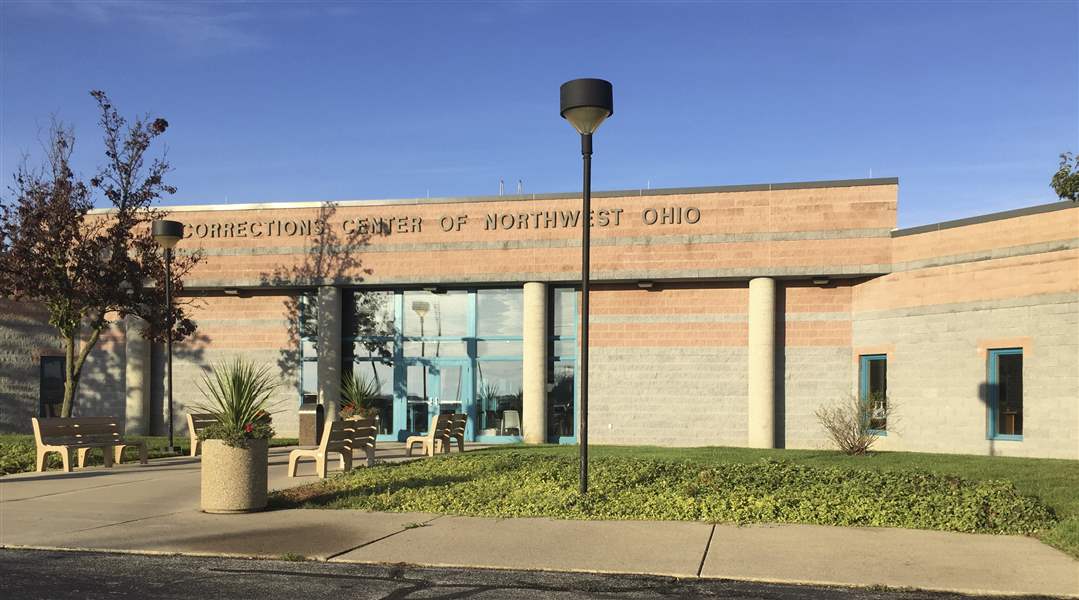
Toledo claims victory in court battle with Lucas County
6/6/2018
Corrections Center of Northwest Ohio
THE BLADE
Buy This Image
The years-long debate over who must pay the cost of housing inmates arrested by Toledo police came to a halt Wednesday.
The Ohio Supreme Court declined to weigh in on the legal battle between the city of Toledo and Lucas County, effectively upholding two lower courts’ findings that the county must foot the bill.

The late Mayor D. Michael Collins in 2014 ordered local police to charge suspects under state law rather than Toledo Municipal Code, which set up the controversy.
“It's the end of the controversy of who is responsible for bearing the incarceration costs of those defendants sentenced out of Toledo Municipal Court under the Ohio Revised Code,” said Toledo City Law Director Dale Emch. “We’re obviously happy that the court, by not taking the case, confirmed our view of the law.”
Without comment, the high court said it would not accept for review an appellate ruling in the case captioned City of Toledo vs. Corrections Commission of Northwest Ohio and the Board of Lucas County Commissioners. Visiting Judge Linton Lewis, Jr., ruled in June, 2016, that Lucas County was responsible for the costs of incarceration and his order was upheld in December by Ohio’s 10th District Court of Appeals.
Fritz Byers, a Toledo lawyer who represents Lucas County in the litigation, could not be reached for comment Wednesday. The Lucas County commissioners released a statement promising to continue working with city leaders.
“Though the Supreme Court has declined to take up the lawsuit over incarceration costs, the Lucas County Commissioners will continue to work closely with the city of Toledo to address the community’s criminal justice needs and ensure the safety of Lucas County citizens,” the statement read. “We look forward to the opportunity to work collaboratively with the city on future projects and initiatives that are in the best interests of all Lucas County residents.”
Retired Ohio Supreme Court Justice Andy Douglas, who also represented Toledo in the litigation, said for as long as anyone can remember the city paid to house inmates that were legally the county's responsibility.
That began to change in 2014 when the late Mayor D. Michael Collins ordered local police to charge suspects under state law, rather than the Toledo Municipal Code, as a way of shifting the financial burden to the county. This was the way other municipalities in Ohio did it, Mr. Douglas said, and “even the County Commissioners handbook says this is the way it’s done.”
Still, he said, the county took the opposite view, and a long — and costly — legal battle ensued. In December, 2015, Toledo filed suit against CCNO, Lucas County, and the four other counties that were members of the regional jail.
“The city made very substantial offers to settle it,” Mr. Douglas said. “Every one was refused because they said they would beat us in court. They've been to the last court they can go to.”
As of April 18, county commissioners had paid $182,773 to Mr. Byers for his work on the litigation, said Mark Reiter, a spokesman for the commissioners. The city, through April 30, had paid $133,580 to Mr. Douglas and his Columbus-based law firm of Crabbe, Brown & James, said Ignazio Messina, a city spokesman.
The issue had major financial ramifications for both sides.
Adam Loukx, an assistant city law director, said the city was paying between $10 million and $12 million annually to house defendants — both at the Lucas County jail and CCNO near Stryker, Ohio — who were charged with or convicted of misdemeanors, such as drunken-driving, domestic violence, theft, and assault.
He said the city still pays to house defendants convicted under city law for local offenses such as violation of nuisance laws and the safe school ordinance, but since Dec. 31, those defendants have been housed at the Wood County jail under a contract that costs the city a base amount of $240,000 a year.
Mayor Wade Kapszukiewicz said in a statement Wednesday that he was pleased the court declined to hear the appeal.
“It is in the best interest of the city and the county to have a good working relationship,” he said. “We have many common goals, including the development of a materials recycling facility, that we want to advance. I am glad this case is finally over, and I look forward to continuing to work with our county on our shared goals and objectives.”
Staff Writer Sarah Elms contributed to this report.
Contact Jennifer Feehan at jfeehan@theblade.com or 419-213-2134.